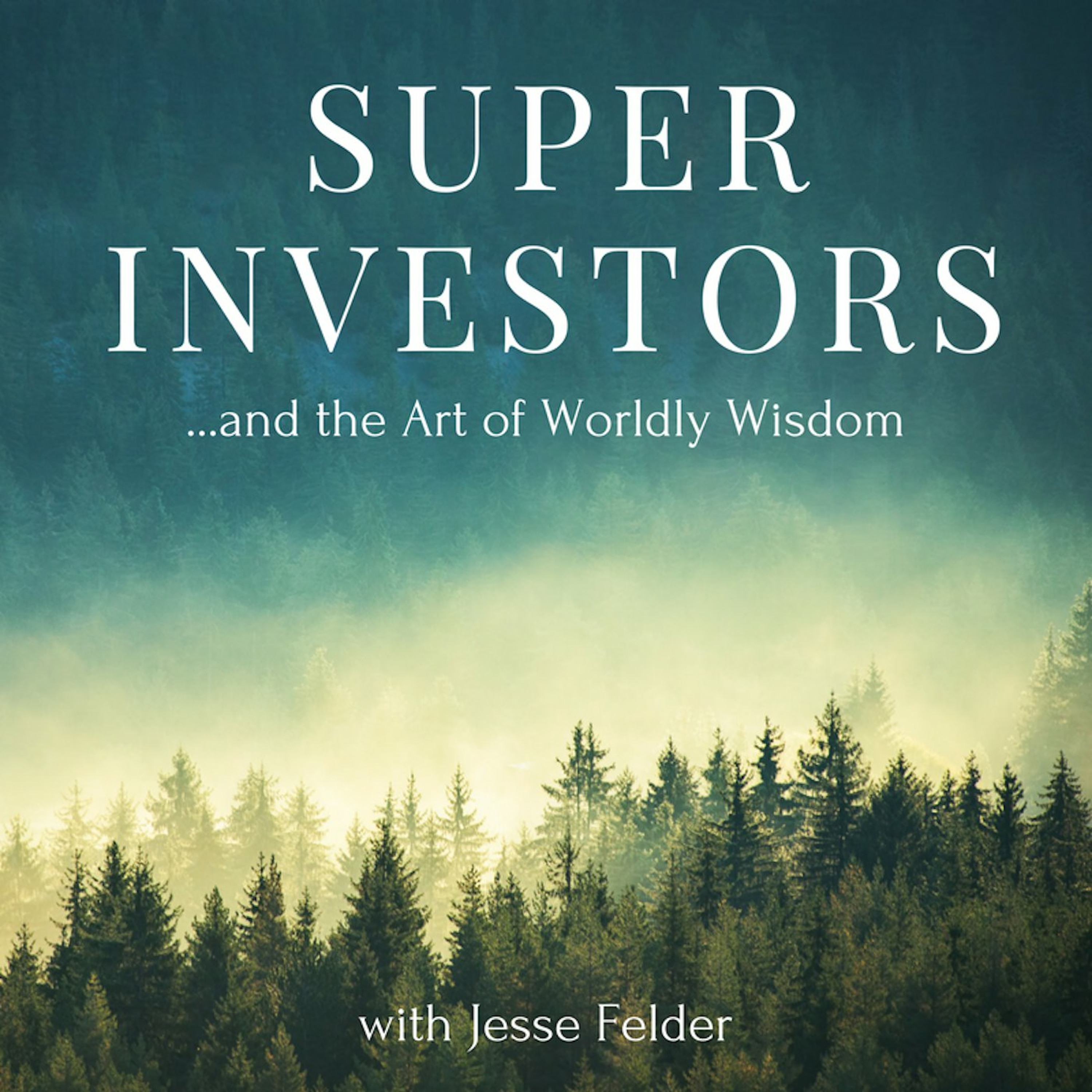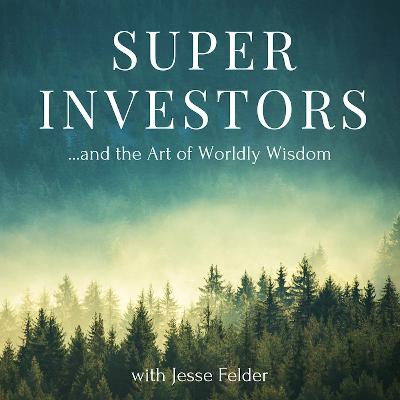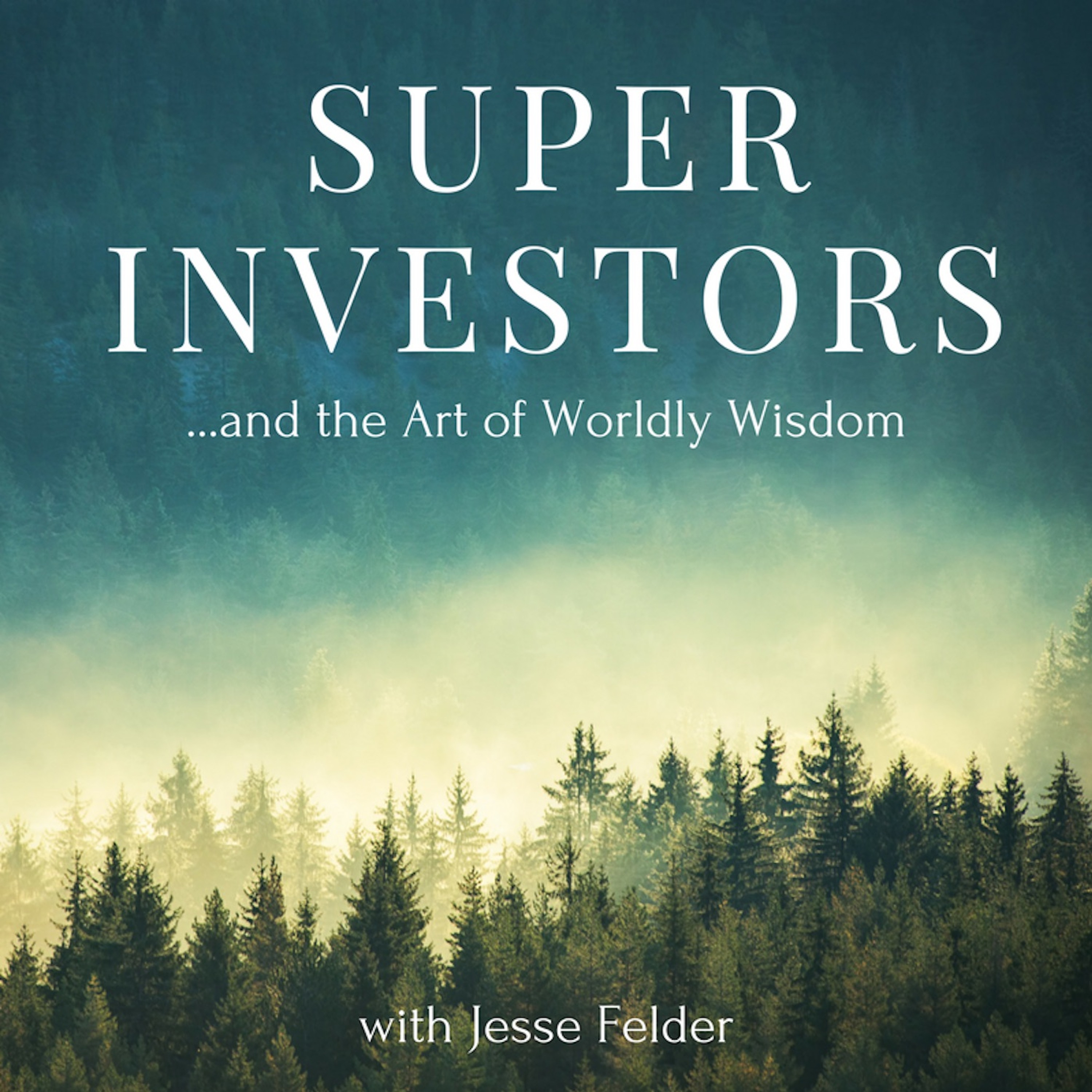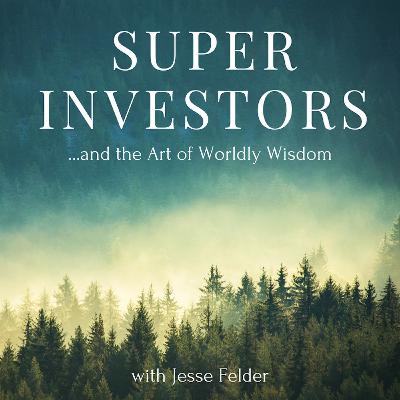Discover Superinvestors and the Art of Worldly Wisdom
Superinvestors and the Art of Worldly Wisdom

Superinvestors and the Art of Worldly Wisdom
Author: Jesse Felder
Subscribed: 2,019Played: 29,899Subscribe
Share
© All rights reserved
Description
Jesse Felder worked for the largest firm on Wall Street, co-founded a multi-billion-dollar hedge fund firm and has been active in the markets for over 20 years. This podcast is his journey to talk with a number of superinvestors who have been an inspiration to him in an effort to understand what makes them so successful in the financial markets and in life.
57 Episodes
Reverse
This episode is long overdue. I've been following the work of Asif Suria for over a decade now and it has proven to be one the best sources of investment ideas I have come across. Asif tracks and writes about everything from predictive insider trading patterns to "ubercannibals," or companies that consistently use excess free cash flow to buyback significant amounts of stock over long periods of time. Profit opportunities created by corporate actions such as risk arbitrage and spinoffs are also featured prominently in his work. Essentially, Asif is a classic value investor in search of a catalyst and, as he consistently demonstrates at his website InsideArbitrage.com, event-driven catalysts can be some of the most effective means to realizing hidden value in the stock market. So it is my true pleasure to finally introduce you to my friend, Asif Suria. For notes and links related to this episode visit TheFelderReport.com.
My guest for this episode is Joseph Wang. Joseph is one of the most knowledgeable people I’ve come across when it comes to the world of central banking and how it intersects with markets. His experience on the open markets desk at the New York Fed gives him unique insight into the inner workings of the financial system and how it has evolved in recent years. In this episode we discuss the shift in both monetary and fiscal policy over the past decade and how it has crucial implications for investors in coming years. For notes and links related to this conversation visit TheFelderReport.com.
My guest for this episode is Ben Hunt. This is Ben’s second appearance on the podcast. I had the pleasure of first interviewing him a few years ago and if you are not familiar with his work, I encourage you to go listen to that episode in which he discusses his background and the key concepts he utilizes in analyzing markets. It’s not at all necessary but his framework is truly fascinating and will give you a deeper understanding of what we discuss here. Today, Ben sees a pattern of rapacious behavior in the markets that extends well beyond the world of finance and impacts each one of our lives in very important ways. He also sees a glimmer of hope in how we can overcome it. For links and notes related to this episode visit TheFelderReport.com.
Variant Perception is an investment research firm founded on the idea that man plus machine beats machine (or man) alone. In an era dominated by passive investing and other purely quantitative strategies with relatively short look back periods on the one hand and rampant speculation in meme stocks and other moon shots on the other, nothing could be more contrarian and perhaps more valuable than taking a more thoughtful approach grounded in historical context and driven by tactical tools that have proven valuable through many market cycles. This is precisely the focus of Variant Perception and its CEO, Tian Yang. In this episode, Tian discusses the details of the firm's unique investment analysis framework and, given the apparent paradigm shifts already underway, how it is especially valuable in assessing markets and the economy today. For notes and links related to this episode visit TheFelderReport.com.
Known as "one of the greatest financial historians alive," Edward Chancellor has been working in the markets for three decades now; his study of finance theory, speculative bubbles and economics goes back even further. 'The Price of Time,' Edward's latest book, is clear evidence of his passion for the subject of financial history and his ability to convey the key concepts in an effective and uniquely entertaining way. The book does a masterful job of chronicling the modern history of easy money and explaining its many "secondary consequences," including, "the collapse of productivity growth, unaffordable housing, rising inequality, the loss of market competition and financial fragility." More than that, it takes the reader on a journey from the beginnings of modern central banking in John Law's Mississippi Company to today's fight against rapidly rising inflation pressures, imploring the reader to think critically about what it all means for the future of the economy and markets. In this episode, Edward shares his inspiration for writing it and his thoughts on what history suggests may lie ahead. For notes and links related to this episode visit TheFelderReport.com.
For over 35 years now, Fred Hickey has consistently performed in-depth research into a wide variety of individual stocks and what drives them over the full market cycle. What's more, during that entire span he's distilled his findings into concise and actionable research for subscribers to his newsletter, The High Tech Strategist. In the process, he's earned a reputation among loyal readers for being both a beacon of true value at times of market opportunity and a voice of reason during periods of overzealous speculation. In this conversation, Fred discusses the recent mania in the markets, how it compares to similar episodes of the past and what those have to teach us about how the current decline in stock prices might unfold in the months ahead. For notes and links related to this episode visit TheFelderReport.com.
This is the third conversation with Diego Parrilla I have published as a podcast but the fourth time I have actually recorded a discussion of ours. The first time Diego was kind of enough to share many of the facets of his investment process, I found only afterwards that, due to a technology issue, the audio recording was sadly unusable. So I was very glad to prevent the possibility of another such mishap by having this conversation in person. Though it was the holy week of Semana Santa in Spain and Madrid was relatively quiet as a result, I found Diego and his team toiling away in their top floor offices at Quadriga Funds. Considering Diego's views have been so prescient of late and his framework for approaching markets so relevant to the current environment, I was especially glad to have the chance to talk with him again. For notes and links related to this episode visit TheFelderReport.com.
For long-time Superinvestors listeners, Kiril Sokoloff needs no introduction. Last summer, he was kind enough to host me at his home in Sun Valley, Idaho where we discussed much of the framework that makes up the foundation of Kiril's research and investment process. In this conversation, he shares how he applies this framework to the inflation debate and the most meaningful conclusions he has reached as a result of this process. Moreover, Kiril explains what it all means for the economy, markets and individual investors. For notes and links related to this conversation visit TheFelderReport.com.
Todd Harrison is truly one of the good guys on Wall Street. After a career that took him from the Morgan Stanley options trading desk to running a major hedge fund and then starting a financial media business, Todd founded CB1 Capital several years ago. The firm, an investment adviser and manager, was born out of Todd's belief in cannabis as a relatively untapped source of wellness and as an investment opportunity. After a 9-month bear market that has seen stock prices in the sector fall, in many cases, over 50%, Todd sees what he now calls a, "generational opportunity" and, "the trade of a lifetime." In this conversation, and in typical Toddo fashion, he candidly shares his work and discusses his thesis behind the trade. For notes and links related to our conversation visit TheFelderReport.com.
Jim Stack has been assiduously studying markets in an effort to develop and hone a full-cycle investment discipline since he was first introduced to stock market risk back in the 1973-74 bear market. That experience instilled in him the modicum of skepticism needed to successfully navigate major market turning points, both tops and bottoms, as well as an infectious enthusiasm for investment research that still drives him today. It also set him on a journey that would eventually see him founding InvesTech Research, one of the most successful investment newsletters in the industry, and later Stack Financial Management, an SEC-registered advisory firm with billions under management. In this episode (recorded in Whitefish, Montana), Jim shares the key stories that shaped him as an investor and the lessons learned along the way. He also discusses how he developed some of the major indicators that drive his investment process and how they currently influence his approach to the market. For notes and links related to this episode visit TheFelderReport.com.
David Hay has been managing money for over 40 years using a tried and true approach steeped in classic value investing paired with an appreciation for technical analysis that can only be developed through vast experience in the markets. What's more, David also has a unique ability to balance a healthy respect for risk management with an openness to opportunities that arise. This has allowed him and his firm, Evergreen Gavekal, to thrive even in the most precarious of market environments. In this episode (recorded in Coeur D'Alene, Idaho), David discusses how he developed his investment methodology over the course of his career, sharing some of the key tactics and techniques he has come to employ and how he is putting them to use today. For notes and links related to this episode visit TheFelderReport.com
For over half a century now, Kiril Sokoloff has not only identified in advance the most significant trends and innovations driving the markets and economy, he has also pinpointed the most attractive investment opportunities afforded by them. As a result, his firm, 13D Research, has become one of the most respected and influential services among institutional investors around the world. In this conversation (recorded in Sun Valley, Idaho), Kiril discusses how he developed and honed his investment approach over the course of his extensive and illustrious career and how he is using it today to isolate the most valuable macro signals in the markets. For notes and links related to this conversation visit TheFelderReport.com.
One thing I try to do with this podcast, is to find people who are taking a truly unique approach to analyzing the markets, those taking the "financial road less traveled," as I like to call it. Well, Michael Oliver is surely one of those. There is traditional technical analysis, the study of charts which has been around for as long as markets, and then there is Michael's, "momentum structural analysis," which is an entirely original way of studying price patterns and trends. It was almost exactly two years ago, I first got the chance to interview Michael about his methods. In this conversation (recorded in Fort Collins, Colorado), Michael goes into even more depth about his analytical techniques and what they are saying about the markets today. For notes, links and charts related to this episode, visit TheFelderReport.com.
Julian Brigden is a master of models. In putting together his macro theses, which have presciently called major moves in everything from inflation and the dollar to the most popular manias in the stock market, he carefully studies inter-market relationships and correlations to come up with a framework grounded in real data rather than arcane theories and formulas. This practical and highly-refined approach has served him well for the ten years he has been running MI2 Partners and for years prior to that. In this episode, (recorded in Breckenridge, Colorado), Julian discusses how he developed this uniquely insightful methodology and how he uses it today to inform his own trading and that of his many institutional and retail clients.
It was just over two years ago Diego Parrilla first joined me on the podcast to discuss his framework for analyzing financial bubbles and what he calls, "antibubbles." You may have noticed that the topic of bubbles and antibubbles has come up in both of my recent interviews with James Davolos, on the topic of inflation, and Adam Rozencwaig, on the mania in green energy stocks. Considering how relevant Diego's framework is to the current market environment and how dramatically the macro backdrop has changed since we last spoke, I thought it would be an opportune time to have him back for a follow up conversation. In this episode, Diego shares his views on the misconceptions underpinning all sorts of asset bubbles at present and how a paradigm shift in inflation threatens to play the role of pin to each of them. He also discusses why he believes cryptocurrencies are, in fact, a bubble and how they have created another opportunity in what he sees as one of the oldest and most enduring of antibubbles: gold. For links and notes related to this episode visit TheFelderReport.com
Back in October of last year, I had the pleasure of discussing the "generational opportunity in energy stocks" with Leigh Goehring. At the time, he made a very compelling investment case for the energy sector and, in just the five months since then, it has nearly doubled in value. Leigh and his firm still believe energy offers compelling value but to truly appreciate it, it helps to also understand the related bubbles in both renewables and electric vehicles. In this conversation, Leigh's partner, Adam Rozencwajg, shares his views on the mania in these so-called green energy stocks, outlining why renewables and EVs are not the panacea for climate change investors believe them to be and why, ironically, the best way to profit from the transition to green energy may be in the very stocks ESG investors are shunning today. For notes and links related to this episode visit TheFelderReport.com
Perhaps the biggest debate in the markets today is regarding the prospect of inflation. Will the massive fiscal stimulus and money printing of the past year or so, paired with shifting trends in global trade and demographics, result in a secular shift in the disinflationary paradigm we have seen for the past 40 years? To try to answer this question and to better understand how to protect one's finances should inflation rear its ugly head again, I reached out to James Davolos, co-portfolio manager of the Horizon Kinetics Inflation Beneficiaries ETF (INFL). In this conversation, James shares his framework for approaching the issue of inflation. He also discusses the merits of not only bringing a value-based equity focus to the problem but also of taking an asset-light approach to the process. We also tackle the risks to the broader equity market posed by all of this. For links and notes related to this episode visit TheFelderReport.com.
Since starting his newsletter roughly a decade ago and then founding RealVision a few years later, Grant Williams has established himself as one of the preeminent creators and curators of financial wisdom in the world. His keen yet conversational interviews with some of the most interesting thinkers in the financial field have inspired investors of every ilk all around the globe and his monthly writings are widely considered invaluable. In this conversation, Grant discusses why and how he recently decided to shift the focus of his business in a more meaningful direction. He also shares what he has learned from his experiences in picking the brains of the greatest investors alive and how it shapes his own thinking today. For notes and links related to this episode visit TheFelderReport.com.
At just seventeen years old, John Hussman's introduction to the world of finance was a job hand drawing charts for an investment adviser who liked his handwriting. From that point on, he was hooked on markets. After receiving his PhD in Economics from Stanford in 1992, he went on to found Hussman Strategic Advisers and has been managing equity portfolios ever since. In this episode, John discusses how he developed his "value-conscious, historically-informed, full-cycle" investment discipline over the past 40 years and how he is implementing it today to navigate one of the most "overvalued, overbought and overbullish" stock markets of all time. For notes and links related to this episode visit TheFelderReport.com.
After a successful career on Wall Street, Danielle DiMartino Booth spent years as special adviser to Richard Fisher while he was head of the Dallas Fed. In her role, she provided an invaluable, markets-based perspective to one of the most independent-thinkers to have served in a leadership position at the Federal Reserve. What's more, she did so during one of the most tumultuous periods in the central bank's history: The Great Financial Crisis. In this interview, Danielle discusses the evolution of the Fed through that period and how the policies developed and implemented then have played a role in everything from inequality and social unrest to asset bubbles and inflation. She also lays out several of the potential outcomes facing investors and citizens alike as the result of the fiscal dominance and monetization of the debt we are seeing today. For notes and links related to this episode visit TheFelderReport.com.








